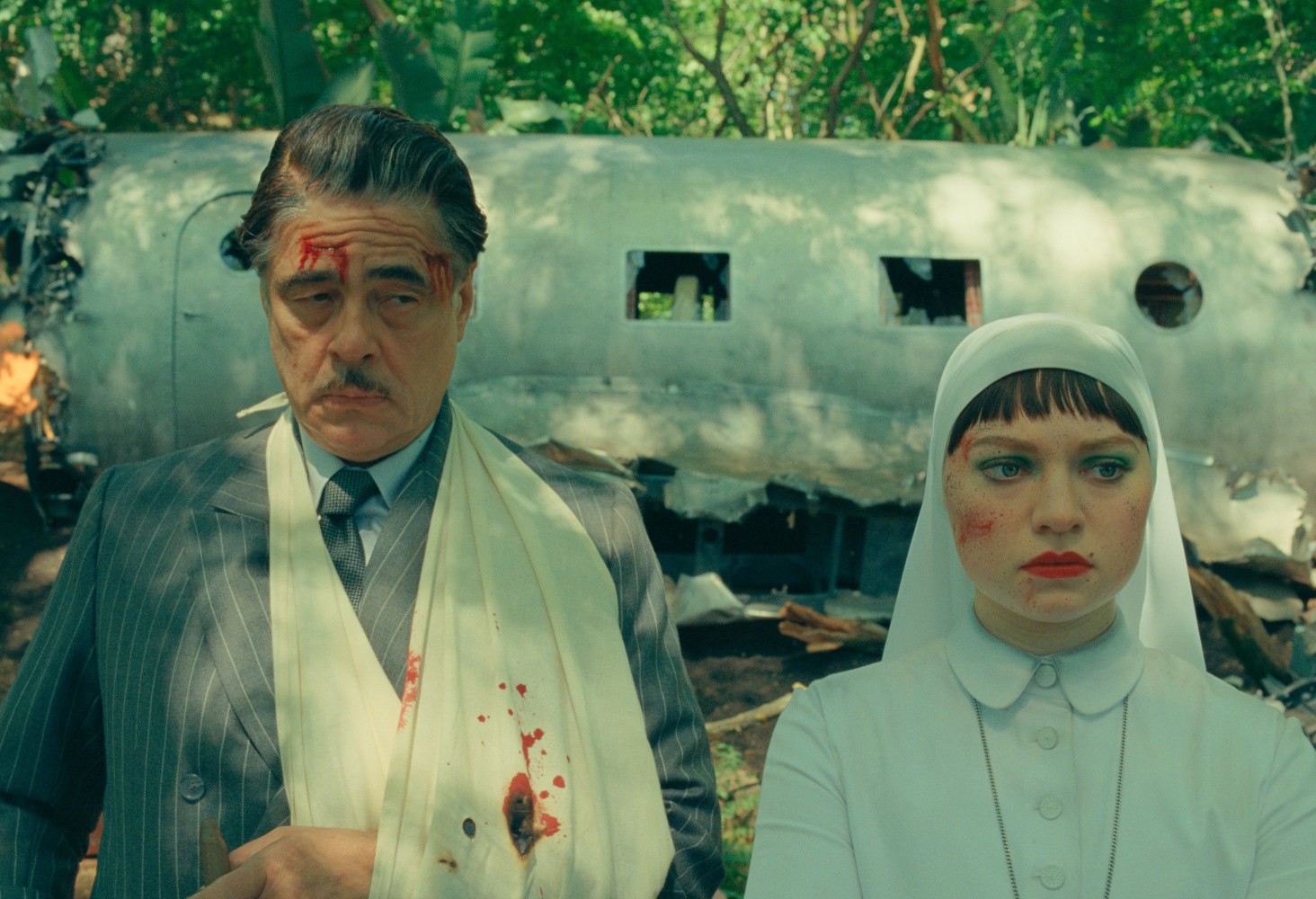FILM REVIEW
THE PHOENICIAN SCHEME
Rated PG-13
101 Minutes
Released June 6th

Wes Anderson movies aren’t for everyone, and they’re not meant to be. They speak to those who like to ponder our existence within the landscapes of our imagination. depicting the human condition in all its pain, joy, and beauty. His characters embody questions and predicaments we all have. The Phoenician Scheme is easier to flow into than most other Anderson films. It follows two protagonists throughout the story, a story of the mundane and the extraordinary, told in vignettes of lives and dreams.
With Anderson’s films, each scene is meticulously staged and so precise it seems otherworldly. One art critic notes that his movies are “like a dollhouse populated with colorful characters.” Some of the sets contain real works of art by Magritte and Renoir. He uses his sets and props to articulate his ideas and to provide a window to his characters’ psyches. When you go to an Anderson movie, you are about to see not a linear story but a fluid painting of humanity. The characters are unique and eccentric, and each person represents something universal that we identify with or that reminds us of people we know.
The movie’s waves of high drama subsiding to emotionless calm mirror our everyday lives. Comedy underlays the relationships as each character faces dilemmas, unexpected upheavals, or interruptions to their goals. The costumes the characters wear, and their hairstyles, are as much a part of the design as are the rooms and landscapes. Their style often obscures their humanity, their emotions, feelings, and lack of confidence, again mirroring our behavior in society. Dialogue is sparse, and feelings are conveyed with extreme subtlety. Anderson cuts through the small talk and strips each character down to their basic humanness.
Anderson grew up in Houston and majored in philosophy at the University of Texas in Austin. His roommate there was Owen Wilson. Anderson, at that point, was already making simple short films. Wilson says that if he had never met Anderson, he probably would not have become an actor. The two made a short film called Bottle Rocket (1993), which included Wilson’s brother Luke in the cast. It was selected to screen at Sundance, and through that festival, Anderson was awarded funding to shoot a full-length version. This is an example of how artists often motivate each other to create works that inspire.
Anderson has pulled together a group of filmmakers and actors who understand his style and want to work with him over and over. Acting in a Wes Anderson movie must be one of the hardest challenges an actor can take on. The detail in his scripts is legendary. The all-star cast in this film aces the task. They include Benicio del Toro as “Zsa-zsa Korda,” Mia Threapleton as “Liesl,” Michael Cera as “Bjorn,” and Jeffrey Wright, Rupert Friend, Bryan Cranston, Riz Ahmed, F. Murray Abraham, Riz Ahmed, Tom Hanks, Bill Murray and more, who gladly work on Anderson’s movies for the experience, not the money. Del Toro says of his character, “It’s layered, it’s full of contradictions, which makes it really yummy for an actor.” Anderson noted that del Toro is “such a strong presence…if you point a camera at him, you get this force.”
Threapleton plays Liesl beautifully, with just the right jaded sarcasm hiding behind a mask of innocence. Anderson chose her from a taped audition, realizing that she had something special to bring to the role. The director did not know that the woman reading with Threapleton on the tape, in a disguised accent, was Kate Winslet, who happens to be Threapleton’s mother.
Threapleton was nervous about working for Anderson but found that even though the director “knows what he’s looking for,” he’s still able to be inspired by something that might happen in the moment. To research her role of a young aspiring nun, she met with a Catholic deacon, read the Bible, and traveled to Rome. Of Anderson, she notes, “He is so clear and clearly having so much fun doing this, you don’t have to think about the plan, you’re just in the moment…in that world.”
Anderson is the only auteur director who can make a movie in his signature style and pull it off. It’s as if he can take our messy political society and drop it into a great landscape painting, then sprinkle it with a whimsical sense of humor, like a political cartoon artist. His characters, even those who only appear briefly on screen, leave a lasting impression. You want to see what they will do, how they will react, to each situation. Anderson’s language is cinema, and he is fluent in it. You can sit back and “listen” with your eyes and ears, and the movie will speak to you.
Kathryn Whitney Boole has spent most of her life in the entertainment industry, which has been the backdrop for remarkable adventures with extraordinary people. She is a Talent Manager with Studio Talent Group in Santa Monica. kboole@gmail.com












